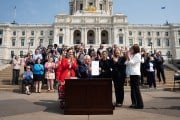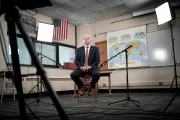Your trusted source for contextualizing Election 2024 news. Sign up for our daily newsletter.
As elected officials, Tim Walz and JD Vance have a record of policy positions and legislative actions that can help shape voters’ perceptions of them and offer hints as to the type of vice president they might be. Walz, 60, has had a much longer political career, though: He served six terms representing a Minnesota district in the U.S. House and, in 2019, was sworn in as the state’s governor. Vance, 40, won his first election in 2022, for a U.S. Senate seat from Ohio.
Our reporters combed through their records and statements since the two became vice presidential nominees — Walz as Kamala Harris’ running mate on the Democratic ticket and Vance as Donald Trump’s on the Republican side — to examine their positions on some key areas to our audiences: abortion, LGBTQ+ rights, child care, disability and aging, education, and guns.
Ahead of Tuesday’s vice presidential debate, we’re publishing a summary of their positions on those issues.
Abortion | LGBTQ+ rights | Child care | Disability and aging | Education | Guns
Abortion
Walz
As governor, Tim Walz established himself as an ally of the abortion rights movement, notably by enacting a law that enshrined “reproductive freedom” into Minnesota’s constitution, making abortion legal in the state at any point during pregnancy. Under his watch, Minnesota repealed other restrictions, including a 24-hour waiting period for people seeking abortions, and passed a law meant to shield state health providers and patients from abortion-related prosecution in other states.
Walz has criticized efforts to restrict access to in vitro fertilization, including an Alabama Supreme Court ruling that temporarily outlawed IVF in that state. He cited his family’s experience with fertility treatment, specifically intrauterine insemination, which involves injecting sperm into the uterus during or just before ovulation to increase the chances of fertilization.
Walz did not take a stance on a Minnesota bill this year that would have required insurers to cover fertility care. The bill did not pass.
Abortion opponents criticized his selection as Kamala Harris’ running mate, with Marjorie Dannenfelser, president of the anti-abortion group SBA Pro-Life America, calling the Democratic duo “the most pro-abortion presidential ticket America has ever seen.” Abortion rights supporters had the opposite reaction. Mini Timmaraju, president of the advocacy group Reproductive Freedom for All, called Walz “a steadfast champion for reproductive freedom.” In her endorsement of the Democratic ticket, pop star Taylor Swift specifically cited Walz’s advocacy around abortion and IVF.
-
More On Walz’s Views:
-
More On Walz’s Views:
Here’s where Tim Walz stands on six key issues — from guns to abortion and child care
Vance
JD Vance has stood against abortion rights while supporting policies he argues would increase birth rates in the United States, such as making childbirth free and financially incentivizing couples to have children.
Vance, who was elected to the U.S. Senate in 2022, ran as staunchly anti-abortion in that campaign. He defended the lack of exceptions for rape and incest in a Texas six-week abortion ban, saying in an interview that “two wrongs don’t make a right.” He also told an anti-abortion radio show that “there’s something comparable between abortion and slavery, and that while the people who obviously suffer the most are those subjected to it, I think it has this morally distorting effect on the entire society.”
In a 2022 debate while running for Senate, Vance said he supported “reasonable exceptions” to abortion bans. But he still broadly opposed abortion, saying he would be “totally fine” with a “minimum national standard” on abortion laws. He also campaigned against a constitutional amendment in Ohio that guarantees a right to abortion and other forms of reproductive health care in the state. In a post on X, Vance described the amendment’s passage last November as a “gut punch” and said conservatives needed to regain trust on the issue of abortion — including by supporting exceptions. (Statutory exceptions to abortion bans rarely work in practice.)
In June, he voted against a Democratic-led bill to enshrine access to in vitro fertilization.
How to watch Tuesday’s debate
- Time: 9 pm to 10:30 pm ET
- Moderators: Norah O’Donnell and Margaret Brennan
- Where to watch: The CBS-hosted debate will air on CBS and stream on Paramount + and CBS News’ YouTube Channel. Other networks, including ABC, NBC, CNN, Fox News and PBS will also carry the debate.
LGBTQ+ rights
Walz
LGBTQ+ organizations have applauded Kamala Harris for picking Walz, who simultaneously coached football as a teacher at Mankato West High School in 1999 and helped start the school’s first Gay Straight Alliance.
As governor in 2021, Walz signed an executive order banning conversion therapy, or the discredited practice of trying to change a person’s sexual orientation or gender identity. In Congress, he co-sponsored the repeal of the Defense of Marriage Act, which defined marriage as a union between a man and a woman and banned the federal government from recognizing same-sex marriages. He also consistently voted in favor of LGBTQ+ rights, like the repeal of “Don’t Ask, Don’t Tell,” which barred LGBTQ+ people from serving in the military.
Walz is backed by transgender leaders eager to see a Democratic ticket that will go to bat against a rash of anti-trans bills in recent years. Transgender journalist Imara Jones praised the choice in a tweet Tuesday. “Tim Walz signed a bill making Minnesota a sanctuary state for transgender people, as well as safeguarding gender affirming care,” Jones wrote. “His nomination sends a powerful signal to the trans community at a moment of unprecedented attacks.”
-
More On Vance’s Views:
Vance
LGBTQ+ advocates have gone so far as to call Vance “cruel when it comes to LBGTQ+ rights.” While running for Senate, Vance said he would have voted against the Respect for Marriage Act, a bipartisan bill that overturned the Defense of Marriage Act and required states to recognize same-sex marriages from other states. Last year, as a senator for Ohio, he introduced a bill to ban gender-affirming care for minors.
Vance has referred to LGBTQ+ people as “groomers,” a slur that suggests that queer people are pedophiles. This rhetoric has struck a particularly sensitive chord with Sophia Nelson, Vance’s former friend from law school, who told the New York Times and NPR that Vance had become “unrecognizable” from the man they knew. Nelson, who is trans, said while they had disagreed with Vance on issues in the past, his harsh views on LGBTQ+ people appeared new and politically motivated.
Child care
Walz
Walz has been a strong advocate for care workers and caregivers, saying it’s been his goal to make Minnesota the best state to raise a family. Last year, he signed a paid family and medical leave law that grants workers 12 weeks at 90 percent of their pay to care for a newborn or sick family member. Workers get an additional 12 weeks off to recover from serious illness. The law includes a rare provision known as “safe time” for domestic violence survivors, which people can use to find safe housing, get a protection order or go to court.
In 2023, Walz launched a $316 million grant program to boost wages for child care workers. Last year, he announced an additional $6.2 million in grants to expand and stabilize child care businesses across Minnesota.
Walz also expanded Minnesota’s child tax credit in 2023 to $1,750 a year, making it fully available to the lowest-income families with no limit on the number of children who can be claimed. It’s the highest child tax credit in the country.
The Harris-Walz campaign has proposed raising the existing child tax credit from $2,000 to as much as $3,600 per child for families with young kids. They’ve also proposed creating a new child tax credit that would give middle- and low-income families with newborns up to $6,000 for the first year of the child’s life, when expenses are highest.
On child care, Harris-Walz are proposing capping costs so that families are spending no more than 7 percent of their income on day care, but haven’t provided further details on how that plan would be structured and financed. Today, day care is more expensive than in-state college tuition in the majority of states.
-
More Debate Context:
Vance
Vance, a father of three young kids, has repeatedly mentioned his desire to improve birth rates while also increasing financial incentives and support for parents to do so, though details of how he’d approach the issue remain scarce. One potential approach: He floated the idea of raising the child tax credit to $5,000 per child and making it available to all families. The campaign has not clarified whether that would be available to the lowest-income Americans, who do not file tax returns, nor has it put out a specific proposal.
Asked about his approach to child care policy recently, Vance said he is supportive of federal policy that doesn’t only incentivize center-based child care. He was talking specifically of kinship care, or when a child is cared for by a relative or close family friend instead of being in a formal day care setting. He also discussed providing more incentives for parents who may opt for a family member or friend to care for their kids.
“One of the ways that you might be able to relieve a little bit of pressure on people who are paying so much for day care is, maybe grandma and grandpa wants to help out a little bit more. Or maybe there’s an aunt or uncle that wants to help out a little bit more. If that happens, you relieve some of the pressure on all of the resources that we’re spending on day care,” he said.
Vance supports reducing some government regulations on child care providers, such as a requirement in Washington, D.C., that many child care workers have an associate degree in early childhood education or a related field.
In the Senate, he has introduced partisan bills to support stay-at-home parenting by prohibiting employers from clawing back health insurance premiums paid while employees are out on parental leave if they decide not to return.
Disability and aging
Walz
Disability is a personal issue for Walz. His son, Gus, has non-verbal learning disorder, or NVLD. NVLD is a developmental disability impacting how people absorb and use information. Walz and his wife have spoken positively about their son in national media, and Gwen Walz made a surprise appearance at the Democratic National Convention disability caucus.
As governor, Tim Walz oversaw a 31 percent pay increase for home care workers and a $1,000 retention bonus, achieved through negotiation between state officials and the Service Employees International Union. This increase also included family caregivers of disabled and older adults, who can be paid through the state’s consumer-directed care program.
He also signed the Minnesota Nursing Home Workforce Standards Board Act, which will establish minimum standards around issues like wages and overtime pay in the state’s nursing homes.
As a result of these investments in disability and aging services, Minnesota ranked #1 on AARP’s first-ever Long-Term Services and Supports Scorecard in 2023, earning especially high marks in support for family caregivers.
Vance
Vance was raised by his grandmother, Bonnie Blanton Vance, affectionately known as “Mawmaw.” In a 2017 interview with NBC, Vance said no one else has had a bigger impact on his life and he spoke about her during his speech at the 2024 Republican National Convention.
As a U.S. senator for Ohio, Vance co-sponsored bipartisan legislation in 2023 that would prohibit health care providers from restricting or denying a person’s access to organ transplants solely on the basis of their disability. The bill did not get a vote, but was recently reintroduced and passed in the House.
He joined about two dozen Republican colleagues in co-sponsoring a bill introduced in January 2023 to criminalize abortion sought due to a positive Down syndrome diagnosis. The bill died shortly after introduction.
In a New York Times interview earlier this year, Vance told conservative opinion writer Ross Douthat that he is against cutting Social Security, even though the pledge is part of the Trump campaign’s platform.
In 2022, while running for Senate, Vance told AARP that he is in favor of Medicare price negotiation. Trump promised Medicare price negotiation during his Presidential run in 2016, but later abandoned it.
Recently on the campaign trail, Vance put forward the idea of moving individuals with chronic conditions to different insurance pools than those used by healthier people. Before the ACA, 35 states had so-called “high-risk pools” for people deemed “uninsurable” by individual market insurers due to their health conditions. The premiums for people deemed “uninsurable” were considerably more expensive than what regular subscribers paid and due to limits on certain conditions and lifetime caps, covered less.
Education
Walz
Walz, a former social studies teacher, was elected to the U.S. House of Representatives in 2006 and prioritized education policy throughout his career. One of his crowning accomplishments as governor was a 2023 law he signed making Minnesota one of six states at the time to offer free school meals.
During Walz’s tenure, Minnesota also launched a program to make college free for students from families with annual incomes under $80,000 and enacted a law requiring public schools to stock free menstrual products in all school bathrooms.
Among his other top achievements are giving students more access to mental health services, making investments to improve child literacy, creating thousands of pre-kindergarten slots and signing a $2.3 billion education budget into law, which the governor’s official website calls “the single-largest investment in public education in state history.”
Walz has spoken out against the education policies of conservatives like Vance, a cosponsor of the Educational Choice for Children Act, which would make it easier for families to send their children to private schools with taxpayer-funded vouchers.
During a viral appearance on MSNBC in July, Walz questioned how vouchers would help the families of Appalachia, which Vance says he represents.
“Where in the heck are you going to find a private school in a town of 400?” Walz asked. “Those are public schools. Those are great teachers that are out there making a difference.”
-
Read Next:
Vance
Vance has been vocal about attacks on diversity, equity and inclusion (DEI) programs, and introduced legislation last year to hold colleges and universities accountable for considering race in admissions. When the Supreme Court ended affirmative action in college admissions in 2023, Vance contacted Ohio colleges and Ivy League universities to warn that they could face a Senate investigation for not heeding the ruling.
During his 2022 Senate campaign, Vance gave a speech called “The Universities Are the Enemy,” arguing that higher education institutions are built on “deceit and lies, not to the truth.” This marked a departure from his 2016 memoir, “Hillbilly Elegy,” in which he said education helped him transcend the economic disadvantages of his childhood and that it could do the same for others.
Vance has also objected to the pro-Palestinian encampments that students built on college campuses this year, introducing the Encampments or Endowments Act to bar colleges that don’t remove the protest tents from receiving federal funding.
During an interview in February, he seemingly backed a state-controlled takeover of universities by praising Hungarian Prime Minister Viktor Orbán’s way of suppressing higher education institutions in his country.
In late August, a 2021 clip of Vance attacking American Federation of Teachers President Randi Weingarten and other educators without children resurfaced. “If she wants to brainwash and destroy the minds of children, she should have some of her own and leave ours the hell alone,” he said. The remarks added to the outrage Vance faced after his 2021 comments calling Democrats “a bunch of childless cat ladies” reemerged in early August.
Guns
Walz
In less than 10 years, Walz has gone from receiving endorsements and donations from the National Rifle Association (NRA) to receiving an “F” ranking from the pro-firearm organization. Last year, he was named State Lawmaker of the Year by Gun Sense University, the annual volunteer conference by Everytown for Gun Safety, a gun violence prevention nonprofit advocacy and research group. He has continued to tell his story of being a hunter and gun owner who has evolved in his stance on gun safety issues — and called attention to the fact that gun owners can support gun safety measures.
As governor, Walz signed a number of gun safety measures into law, including universal background checks, a “red flag” law that allows law enforcement or family members to petition a judge if there are concerns around someone’s use of firearms and harsher punitive measures for people caught purchasing a firearm for someone ineligible of gun ownership. Earlier this year, he signed legislation to prohibit automatic weapon modification devices and for the state to collect gun crime data.
Walz has spoken publicly about his evolution on gun safety: Following the Route 91 Harvest Festival mass shooting in Las Vegas in 2017, he donated the $18,000 in campaign contributions he had received from the NRA to a fund supporting the families of service members injured or killed in active duty. After the mass shooting at Marjory Stoneman Douglas High School in Parkland, Florida, a few months later, Walz called in an opinion piece for the Minneapolis Star-Tribune for an assault weapons ban, writing, “I’ve listened hard to students, parents, law enforcement, teachers, sportsmen and survivors of gun violence, in every corner of Minnesota. And while they have different perspectives, I’ve heard them all say one thing loud and clear: This. Needs. To. Stop.” He then cosponsored an assault weapons ban during his final year in Congress, in 2018.
Vance
During his Senate campaign, Vance voiced opposition to assault weapons bans, universal background checks and red flag laws. He received $500,000 in campaign contributions from the NRA. While campaigning, he also said that had he been in office, he would have voted against the Bipartisan Safer Communities Act, the 2022 bill signed into law by President Joe Biden that is the most robust piece of gun safety legislation to have been enacted in over 30 years.
Vance has also spoken out against red flag laws, increased background check measures and bump stock bans, saying that further investment in law enforcement and mental health services are the best protective measures against gun violence, especially school shootings. On the campaign trail, he has not offered details on what kind of plans he would implement to support and invest in these kinds of programs.
Following the mass shooting at Apalachee High School in Winder, Georgia, in September, Vance called school shootings “a fact of life.”
To check your voter registration status or to get more information about registering to vote, text 19thnews to 26797.
Chabeli Carrazana, Jennifer Gerson, Kate Sosin, Nadra Nittle, Sara Luterman and Shefali Luthra contributed reporting.









